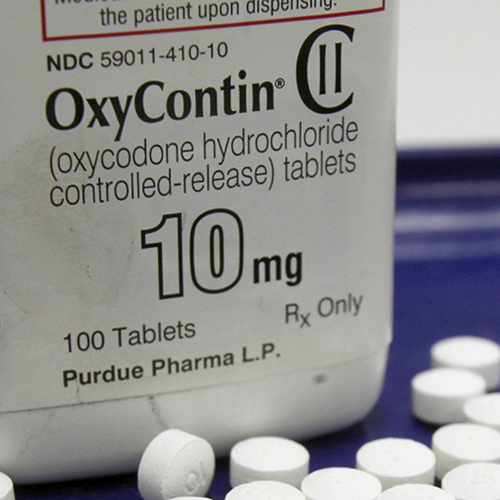

Oxycodone is a prescription pain reliever that doctors often prescribe to patients suffering moderate to severe pain, though it has in recent years been prescribed for mild to moderate pain. This combined with the drug’s habit-forming qualities quickly made oxycodone a popular drug of abuse. Oxycodone is usually prescribed in 10 to 80 mg oral tablets, though it does come in a quick release 5 mg tablet that is designed to alleviate pain in mere minutes.
Its high addiction potential and easy availability makes oxycodone one of the most dangerous drugs in the country. The Substance Abuse and Mental Health Services Administration found that over 182,000 emergency room visits throughout the United States in 2010 involved oxycodone use.
Symptoms of Oxycodone Addiction
Symptoms of Oxycodone Addiction
Oxycodone is known to cause strong physical dependence, even for those who have been prescribed it for legitimate problems. Oxycodone, like other drugs, works directly on the brain to affect how your body perceives and responds to pain. This disrupts the delicate balance of chemicals in your body, usually dopamine, the chemical involved in motivation, reward, and certain motor functions. To adjust, your brain produces less dopamine on its own, forcing you to take more oxycodone to gain that sense of reward while giving your body the dopamine it now needs.
Oxycodone generally works on a steady, timed release built into the pill’s design. Many people who abuse oxycodone will consume it in other ways to bypass that timed release and get that immediate rush. The most common ways are:
- Crushing the pills into a powder to be snorted
- Chewing the pills
- Crushing the pills into a powder that is diluted in water and injected
Some other common oxycodone addiction symptoms include:
- Running out of a prescription faster than is prescribed
- Finding paraphernalia in the user’s possession
- Using oxycodone as a means of coping with stress
- Disinterest in former hobbies, family time, or recreational activities
- Neglecting responsibilities
- Using oxycodone even though it has knowingly caused legal, financial, relationship, or health problems in your life
Oxycodone Withdrawal Symptoms
- Trembling
- Vomiting and nausea
- Diarrhea
- Pain or stiffness in bones and joints
- Insomnia
- Chills
- Irritability
- Depression
- Intense cravings
Effects of Oxycodone Use
Effects of Oxycodone
As a pain reliever, oxycodone is designed to provide feelings of relaxation and euphoria. Despite these pain relieving benefits, oxycodone can come with a variety of other side effects that can be detrimental to your health, including:
- Chills
- Cold sweats
- Fever
- Dizziness
- lightheadedness
- Tremors or twitching
- Labored breathing
- Tightness in the chest
Dangers of Oxycodone Use
Oxycodone is a highly addictive drug. Addiction can cause a wide range of physical problems, but it can also control your actions. You may lash out, exhibit reckless behavior, or push away friends and family.
Oxycodone can also cause dizziness or lightheadedness, making it a danger to drive or operate machinery while using the drug. The drug is most dangerous to those with preexisting breathing problems. Oxycodone abuse can potentially stop your breathing.
Complications of Oxycodone Use
- Abdominal cramps or vomiting
- Swelling in the face or extremities
- Dehydration or dry mouth
- Increased amount of urine
- Chest pains
- Convulsions
- Rapid or irregular heartbeat
- Tingling in the feet or hands

Medical Intervention for Oxycodone Abuse
Medical Intervention
Medication plays an important role in the recovery process and is an essential part of oxycodone withdrawal treatment. It maintains a chemical balance while working out toxins and helping you better manage certain withdrawal symptoms. Most doctors will recommend an opiate receptor antagonist, which is designed to block the effects of opiates like oxycodone. Popular opiate antagonist medications include methadone and suboxone. Methadone is beneficial in that it:
- Can be taken just once a day
- Prevents the use of more illicit drugs
- Can help fight back against relapse or overdose
- Treats addiction without hampering your everyday living
RECOVERING FROM OXYCODONE ADDICTION
The Road to Recovery
Detox often leads directly into longer 30-, 60-, or 90-day rehabilitation programs. While detox helps you regain your physical health, rehab works to give you the tools and help you need to stay sober and healthy in the long-term. By starting with a supportive detox program you get the medical treatment needed to set yourself up for success and prevent relapse.

Find the Right Oxycodone Detox Center for You
Georgia Drug Detox is here to help you find an inpatient detox center that matches your needs. Feel free to contact us if you have any questions about insurance or the treatment process. If you’re ready to begin the admission process, call us at (678) 771-6411 and take the first steps on the road to recovery.

